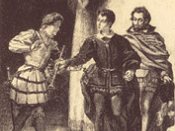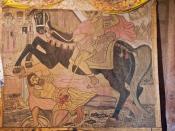Spying: An Act of Destructiveness In William Shakespeare?s Hamlet, one of the main themes that continue throughout the play is spying. Spying forms a functional part in Hamlet, as it communicates character?s feelings through the reports of the spies. It is also an indication of the times and frailty of Denmark. In Hamlet?s time and home country, people functioned through the use of complicated spying networks. This seems to have had destructive effects on the lives of most of the characters, but especially on Hamlet. Claudius and Polonius also participate in the act of spying, but it only becomes fatal for Polonius. Although Claudius does die, it is not directly from spying. Spying, whether it hurts someone or not, is a destructive act.
The first incidence of spying occurs when Claudius finds that Fortinbras is making advances on Denmark. He sends spies to Norway to inform the King of Fortinbras actions.
This exemplifies how spying is a common occurrence of the times, used not to hurt people but to inform them. This is the only instance where spying does not directly hurt anybody. After Hamlet?s father dies, Hamlet returns to find that his mother has hastily and disloyally married his uncle. After his suspicions of foul play are confirmed, Hamlet makes a plan to feign madness as he is constantly being spied on. Claudius employs Rosencrantz and Guildenstern to discover the cause of Hamlet?s madness. Eventually, their orders from Claudius are changed to escort Hamlet to England where he is to be killed. Hamlet finds out about these instructions and changes them so that Rosencrantz and Guildenstern are killed. Claudius, with the help of Polonius, spies on Hamlet while he has a conversation with Ophelia. The king wants to see if Ophelia is really the cause of Hamlet?s madness. After Claudius listens to the conversation he says, ?Love? his affections do not that way tend? Was not like madness. There?s something in his soul o?er which his melancholy sits on brood? Will be some danger?Thus set it down: he shall with speed to England? (Hamlet 3.1. 172-179). Claudius, along with Polonius, spy on Hamlet.
Polonius?s main activity is spying. He instructs his servant Reynaldo to spy on Laertes and to report back on his behavior. Polonius wants to know everything about his son and his ??drinking, fencing, swearing, quarrelling, Drabbing?? (2.1. 27-28). He wants to make sure that his son is keeping their good name in France. He tells Reynaldo that ?By indirections find directions out.? (2.1. 61-63), which means that only by wrong doing will he find out the truth. Polonius also plans a meeting between Hamlet and Ophelia to see what is the cause of Hamlet?s discomfort. He plans to listen in on the conversation. He says that he and Claudius will ?be behind an arras? Mark the encounter. If he love her not, And be not from his reason fall?n thereon?? (2.2. 179-183). Polonius decides to help Claudius by spying on a private discussion between Gertrude and Hamlet in her bedroom. To do this, Polonius decides to hide behind a curtain. Unfortunately, Polonius?s spying and deceitfulness lead to his death. While Hamlet was accosting his mother, Polonius cried out for help behind the curtain and Hamlet plunged his sword through it killing Polonius. Hamlet only found out it was Polonius after he killed him. Before he did it he thought that King Claudius might be the one behind it. Polonius? spying ends his life but Hamlet gets to keep on spying.
The most interesting occurrence of spying is when Hamlet sets up his play in which he will judge the King?s guilty face to see the secrets of his conscience. This play, ?The Murder of Gonzago? is not only used for Hamlet to spy on Claudius, but it is a way of communicating to the King that Hamlet knows he is guilty. Hamlet says he will use the play, ?wherein I?ll catch the conscience of the king? (2.2. 581-582). He will see if the king shows any sign of discomfort while the king in the play is killed. If Claudius does then Hamlet knows that his inclinations are right, and Claudius killed his father. Hamlet also spies on Claudius while he is praying. While Claudius says, ?O, my offense is rank, it smells to heaven?? (3.3. 39), Hamlet is behind a pillar saying, ?Now might I do it pat, now he is praying; And now I?ll do?t? A villain kills my father?do this same villain send to heaven?No? (3.3. 76-90). Hamlet comes to the conclusion that it is not right to kill Claudius while he is praying because then Claudius will be sent to heaven and that is not revenge. Hamlet will kill Claudius ?When he is drunk asleep; or in his rage; Or in the incestuous pleasure of his bed (3.4. 92-93), and upon this act Claudius will be sent to hell. Hamlet also spies on Ophelia and Polonius when they have a conversation about him. Hamlet hears Polonius tell Ophelia to stay away from Hamlet. In the conversation he hears Ophelia say that she will stay away from him. This causes Hamlet to act like he is mad when he is around her. He looks down upon her because she listens to her father and does not try to fight his decision. Hamlet sees her as inferior and treats her different by acting mad. Like Polonius and Claudius, Hamlet uses spying to find out information. Even though he does less spying than they do, he still meets the same fate.
In Hamlet, spying and deceitfulness lead Polonius, Claudius, and Hamlet to their deaths. Claudius and Polonius spy on Hamlet and Hamlet in turn, spies on them. It is a recurring theme that exists throughout Hamlet. It is a counter productive and untrustworthy act that can only lead to the destruction of the spy. While in Hamlet, only one character directly dies from spying, all three characters meet their ultimate demise because of their actions. Their meddling and scrutiny of each other translates into distrust and betrayal that ultimately leads to their death. Spying, a result of distrust and betrayal, causes only harm to the people it involves. Hamlet shows that dysfunctional relationships lead to madness and paranoia.





